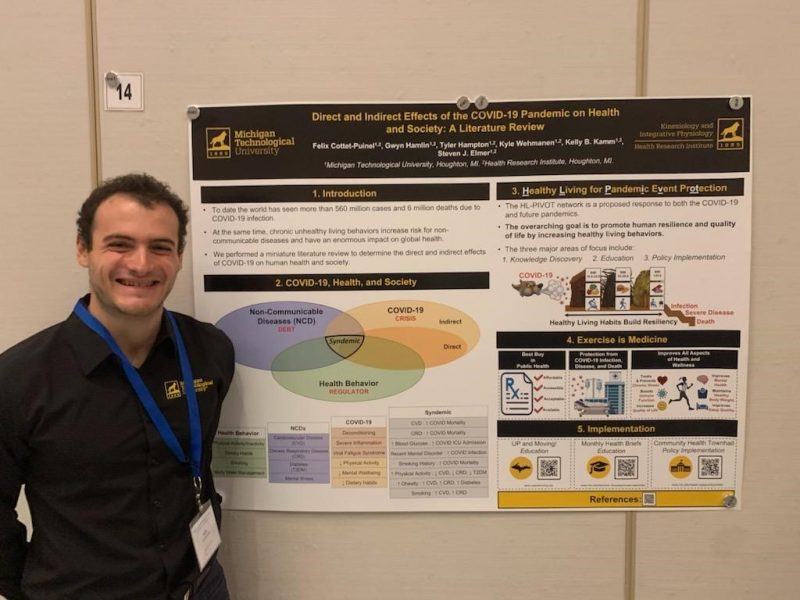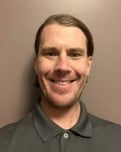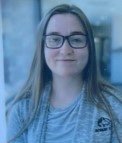Graduate students in the Advanced Exercise Physiology Course (KIP 5000) recently attended several conferences and presented class projects collaboratively built through the first part of the semester. The course taught by Dr. Steven Elmer in the Department of Kinesiology and Integrative Physiology (KIP), tasked students with conducting a literature search to evaluate the direct and indirect effects of the COVID-19 pandemic on human health and society. In support of Exercise is Medicine on Campus Month, the student projects emphasized the important role that physical activity has in combating both chronic and infectious disease.
Midwest ACSM Conference
Master’s student Felix Cottet-Puinel and doctoral student Kyle Wehmanen attended the annual meeting for the Midwest Chapter of the American College of Sports Medicine held in Indianapolis, Indiana on October 20-22, 2022. The mission and purpose of the conference was to promote scientific advancement, disseminate information regarding sports, physical activity, and medicine, and foster collaborative relationships between students, educators, scientists, and physicians across the region. Felix and Kyle presented their class work during the first poster session of the event with great success. Visitors were highly engaged with the poster’s topic spotlighting the problematic synergy between multiple long-standing health pandemics (non-communicable diseases) and the crisis of the emergent COVID-19 pandemic. Their work also laid out evidence based on the HL-PIVOT Model (Healthy Living for Pandemic Protection) for leveraging healthy living behaviors including physical activity to combat these multiple pandemics. They shared ways the KIP students and faculty are working to increase activity and health in our community. Our Michigan Tech attendees also enjoyed learning outside their direct areas of study. Dr. Andrew Jagim from the Mayo Clinic delivered a fantastic keynote on nutrition in athletes and how they are often not meeting their basic needs. Also during the trip, Felix, Kyle, and several other KIP graduate students visited Dr. John Durocher at Purdue University Northwest to foster collaborative relationships across institutions. At the end of the day, it was a fantastic experience. Felix said, “I learned a great deal, and had a ton of fun presenting. The only thing I would change is making the poster session twice as long!”
Global and Community Engagement Conference
Master’s students Tyler Hampton and Gwyn Hamlin presented at the D80 Conference here at Michigan Tech University on October 29, 2022. The theme of the interdisciplinary conference was “Re-energizing Our Communities Through Service.” These students expanded upon the work described above to deliver an oral presentation to a broad audience consisting of students, staff, faculty, and community members. A key component of the presentation was highlighting the community service that the KIP Department provides delivering live and recorded physical activity workouts through a free program called UP & Moving. Attendees were very interested in how the general public views “physical activity” as a means to go to the gym, while Tyler and Gwyn pointed out that this could be something as simple as walking the dog or shoveling snow during our long winters here in the Upper Peninsula. These students also had the opportunity to listen to the keynote speaker Dr. Kurt Paterson, who presented “Global Engagement, Problem-Solving, or Impact.” Dr. Paterson’s return to Michigan Tech was very welcomed as he participated in the first D80 Conference held here. This is especially true since he really got the audience thinking at the end of his presentation. After the conference Gwyn said, “I enjoyed the setting of the conference and I think it went well. We were able to answer questions at the end and provide additional information on the importance of being physically active during the pandemic and beyond.”
Attending these conferences helped KIP graduate students gain valuable experience bridging the gap from classroom learning to a professional setting while sharing their ideas in a supportive environment. Moving forward, we plan to capture this momentum and include more graduate and undergraduate students in similar work. Finally, the graduate students would like to thank the KIP Department for their support, and specifically, Dr. Elmer for his guidance throughout the process.




